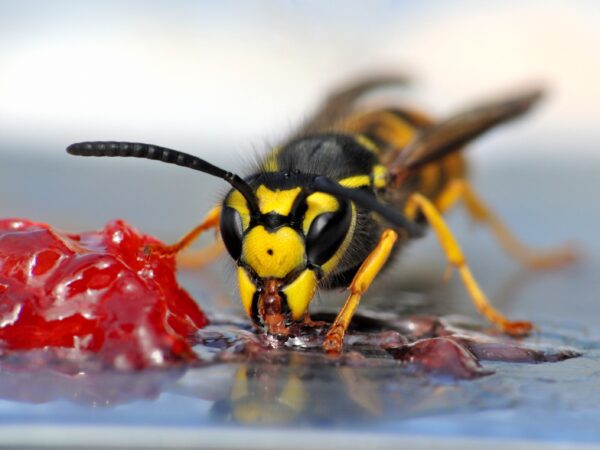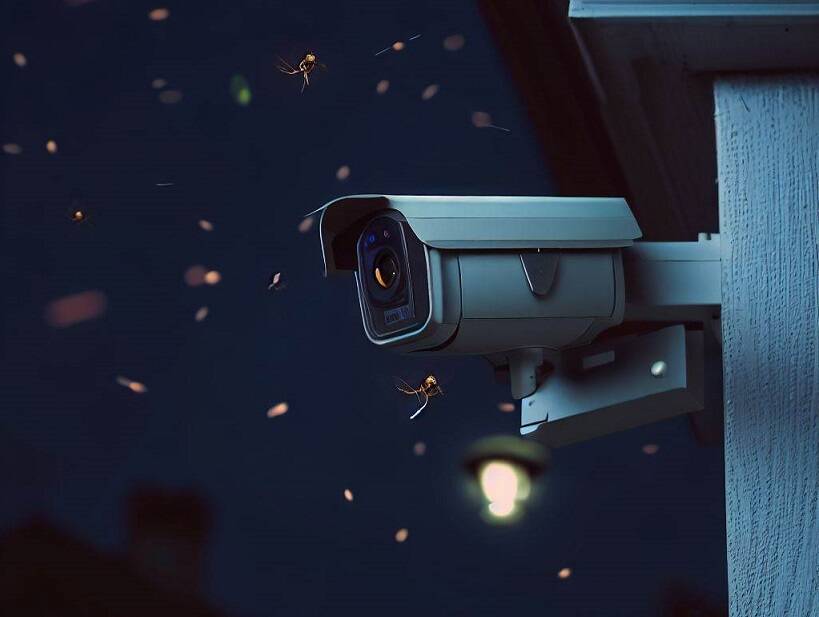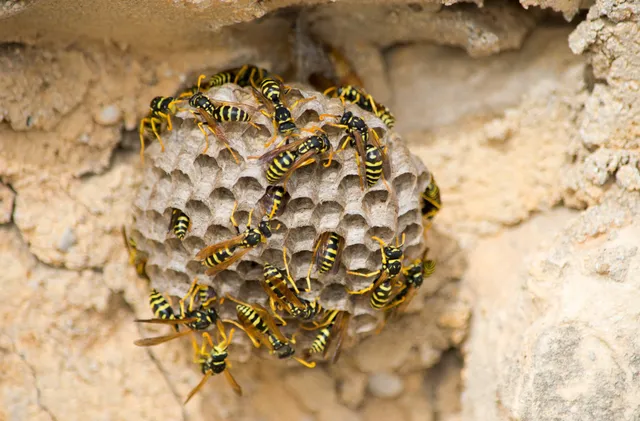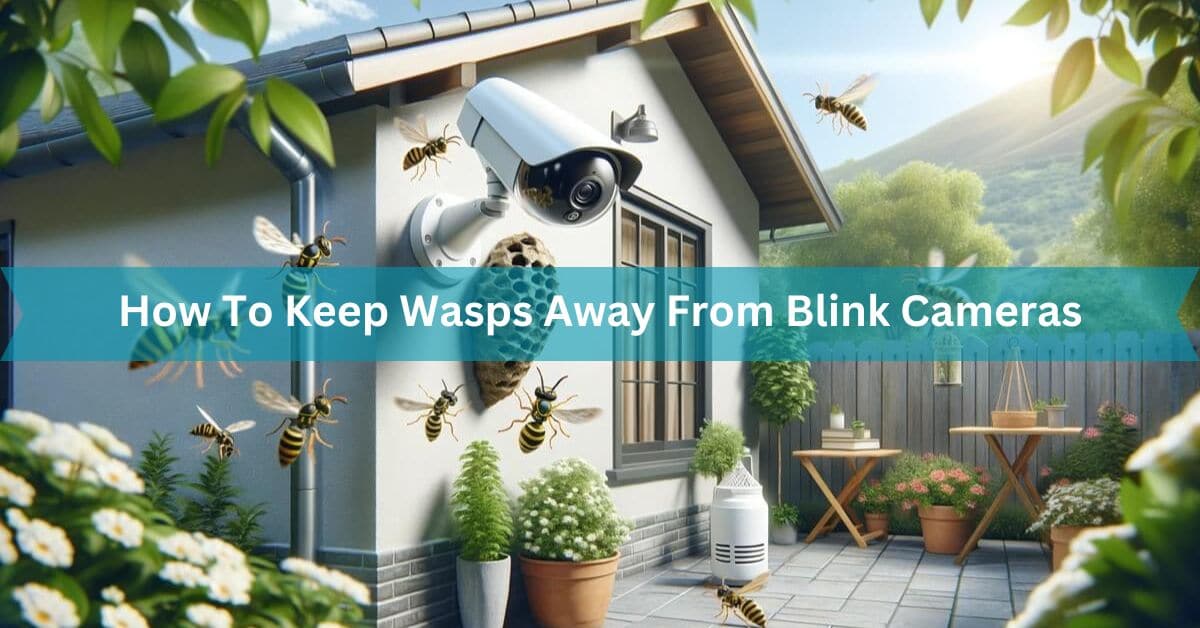Have you ever set up your Blink cameras to find wasps buzzing around them? It’s a common problem, but it doesn’t have to be. Wasps are naturally drawn to specific environments, and your Blink cameras might offer them the perfect spot.
To keep wasps away from Blink cameras, use natural repellents like peppermint oil, clean the camera area often, seal gaps, and install decoy nests nearby. Regular checks and maintenance help prevent wasps.
In this article, we will talk about “How To Keep Wasps Away From Blink Cameras.”
Table of Contents
Understanding Wasps and Their Behavior:

Why Wasps Are Attracted to Cameras:
Wasps are opportunistic creatures. They love warmth and secluded spots, making cameras an attractive location. The heat generated by your camera and the reflective surfaces can mimic natural nesting areas, luring them in.
The Risks of Wasps Near Cameras:
Not only can wasps damage your camera, but they can also turn your regular camera check-ups into a stinging hazard. A small nest can quickly escalate into a significant infestation if ignored.
Preparing Your Blink Camera for Wasp Prevention:
Choosing the Right Location:
Place your Blink cameras away from sheltered spots like roof eaves or dense shrubs, prime nesting areas for wasps. Opt for open spaces where these pests are less likely to linger.
Regular Maintenance:
Clean your cameras regularly, especially around the edges. Dust and debris can attract insects, which in turn attract wasps.
Natural Wasp Repellents:
Essential Oils:
Essential oils like peppermint, clove, and lemongrass are excellent natural deterrents. Mix a few drops with water and spray the solution around your cameras.
Vinegar and Water Mixtures:
Combine equal parts vinegar and water to make a DIY repellent. It’s safe, inexpensive, and effective at keeping wasps at bay.
Plants That Repel Wasps:
Consider planting wasp-repelling greenery such as eucalyptus, citronella, or marigolds near your Blink cameras. These plants not only deter wasps but also beautify your surroundings.
Physical Barriers for Wasps:
Installing Protective Covers:
Use mesh covers specifically designed for Blink cameras. These create a barrier without obstructing the camera’s view.
Using Decoy Nests:
Wasps are territorial and avoid areas where other nests exist. Hang a decoy nest nearby to discourage them from settling in.
Store-Bought Wasp Repellents:
Spray Repellents:
Choose sprays that are safe for use near electronics. Look for eco-friendly options to avoid harming the environment.
Adhesive Strips and Sticky Traps:
Place traps near but not directly on your Blink cameras. These traps catch wasps before they get too close.
Safe Removal of Wasp Nests Near Cameras:
When to Call a Professional:
If you spot a large nest near your cameras, leaving it to the pros is best. Attempting to remove it yourself could result in stings and injuries.
DIY Removal Tips:
For smaller nests, wear protective gear and approach carefully. Use a long-reach wasp spray and ensure you’re at a safe distance.
Long-Term Solutions to Keep Wasps Away:
Regular Inspection Schedules:
Make it a habit to check your cameras and their surroundings regularly. Early detection prevents big problems down the line.
Combining Methods for Maximum Effectiveness:
Layer your defenses by using repellents, physical barriers, and strategic placement of traps.
Why are wasps attracted to my security camera?

Wasps are attracted to security cameras because of the warmth they produce, small spaces for shelter, and lights that may draw them, especially at night. Regular cleaning helps reduce the attraction.
Why are bees attracted to my Blink camera?
Bees are attracted to Blink cameras because of warmth, light, and small spaces that feel safe for nesting. Cleaning regularly and sealing gaps can help keep bees away from the camera.
How to keep wasps away from blink cameras at night?
To keep wasps away from Blink cameras at night, use natural repellents like peppermint oil, install decoy nests, reduce camera light, and check for nests regularly to remove them early.
How to keep wasps away from blink cameras outdoor?
To keep wasps away from outdoor Blink cameras, use peppermint oil, seal gaps, clean the area often, install decoy nests, and place the camera away from flowers or trees that attract wasps.
How do I keep wasp away from my Blink camera?
To keep wasps away from your Blink camera, clean the area often, use peppermint oil as a natural repellent, seal small openings, install decoy nests, and check regularly for any signs of nests.
How to keep insects away from blink cameras?
To keep insects away from Blink cameras, clean the area regularly, use natural repellents like peppermint oil, reduce nearby lights, seal gaps in the camera, and place it away from plants or water sources.
How to keep bees away from Blink camera?
To keep bees away from your Blink camera, use peppermint oil, seal small openings, clean regularly, and place the camera away from flowers or plants that attract bees. Check for nests often.
Wasp Ring camera:
A “Wasp Ring camera” is a situation in which wasps are attracted to or build nests near your Ring camera. To prevent this, clean the camera area, use repellents, and seal any gaps around the device.
Does anyone have trouble with outdoor blink cameras attracting insects?
Yes, some people have trouble with outdoor Blink cameras attracting insects like wasps, bees, or mosquitoes. To prevent this, clean the camera area, use repellents, and seal any gaps to avoid attracting insects.
How to stop bees/wasps/hornets from entering PTZ cams?
To stop bees, wasps, or hornets from entering PTZ cameras, seal any openings, clean the area regularly, use natural repellents like peppermint oil, and place decoy nests nearby to keep them away.
What smell keeps wasps away?
Wasps dislike the smell of peppermint, eucalyptus, citronella, and clove. Using essential oils with these scents can help keep wasps away from areas like Blink cameras and outdoor spaces.
Wasp repellent for an object/area?
Natural repellents like peppermint oil, citronella, or eucalyptus can repel wasps from an object or area. You can spray these oils around the area or apply them to the object for protection.
Prevent Wasps with Standard Pest Control Practices:

To prevent wasps with standard pest control practices, seal entry points, remove food sources, clean areas regularly, use traps and apply wasp repellents. Professional pest control services can also help manage infestations.
FAQs:
1. Can wasps damage Blink cameras?
Yes, wasps can clog ventilation areas and interfere with the camera’s functionality.
2. What are the best natural repellents for wasps?
Essential oils like peppermint, clove, and vinegar-water mixtures work wonders.
3. Is it safe to use store-bought sprays on Blink cameras?
Yes, choose sprays labeled as safe for electronics to avoid damage.
4. How often should I check my camera for wasps?
A monthly inspection is ideal but increases frequency during warmer months.
5. What should I do if a wasp nest is already present?
For small nests, carefully remove them with a spray. For larger nests, call a professional.
6. How can I clean my Blink camera without attracting more wasps?
Use mild, soapy water and clean the camera during cooler parts of the day when wasps are less active. Avoid sugary cleaners, as these could attract wasps.
7. Are there specific Blink camera models that are less prone to wasp issues?
No specific model is wasp-proof, but keeping any camera well-maintained and free from attractants can help.
8. Is it safe to use Blink cameras in areas with heavy wasp activity?
Yes, but take preventive measures such as sealing gaps, using repellents, and positioning the camera wisely to reduce wasp attraction.
Conclusion:
Keeping wasps away from your Blink cameras doesn’t have to be a hassle. By understanding their behavior and using natural, physical, and store-bought solutions, you can ensure your cameras stay wasp-free year-round.

